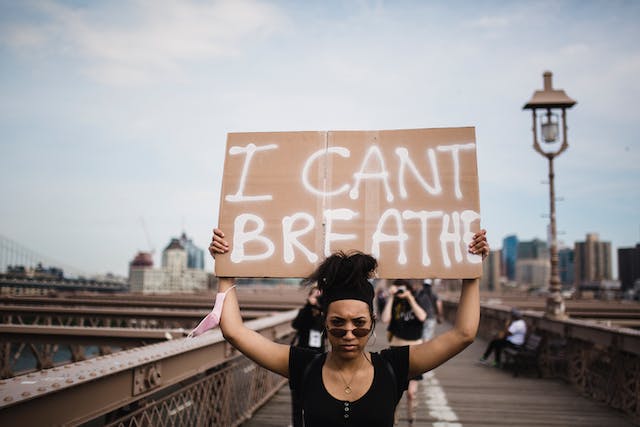The world in general and America in particular, is shocked by the constant flashbacks of the video of an African-American man, Mr. Eric Garner, resisting arrest and being wrestled to the ground by a group of white policemen. Put into a chokehold grip with the police on top of him, Mr. Garner could be heard screaming “I can’t breathe, I can’t breathe”. In spite of this gut-wrenching moan, Mr. Garner continued to be choked and held down until he finally dies. After viewing this video, I found myself stopping in silence. It was surreal. So many questions flooded my mind. Did this really happen? Is there something that we the public are not being shown? Is this just the face of racism and another case of police brutality? But the most challenging question for all of us, Republican and Democrat, right and left, conservative and liberal, local and foreign, Christian or non-Christian, is “How could this happen?” The release of the Grand Jury report of Staten Island indicating that no one would be indicted in this matter was another blow, leaving more painful, confused, sinking feelings of unbelief and shock.
Visiting Washington D.C. on Friday December 5th 2014, I watched a television broadcast filled with diverse groups of demonstrators in the major cities of New York, Boston, Washington, D.C. shouting “I can’t breathe, I can’t breathe.” Later, driving through Chinatown on our way to dinner, my companions and I encountered more demonstrators shouting, “I can’t breathe, I can’t breathe.” Sitting down to eat in the restaurant, the words continued to haunt me and I found myself feeling the pathos, hopelessness and despair of the victim, Mr. Garner. As the waiter came to serve me, it seemed as if the words ringing in my mind (“I can’t breathe”) became associated with my own feeling of ‘I can’t eat’. For a moment, it seemed so easy to respond to the request of an unarmed, helpless man, by taking one’s hand off his neck and letting him breathe. But then, after awhile, I got it!
For the past few years, I’ve been researching and exploring the concept of shame. Shame is a masked emotion of mixed feelings which include anger, rage, grief, disappointment, shock, unbelief and meaninglessness, that result in painful feelings of abandonment, rejection and humiliation.
Shame (Self Hatred Aimed at M.E.) results from the shattering of a cherished or deeply desired dream, wish, hope or expectation. It is hidden and often related to our deep secrets. We don’t see shame, but only the faces of shame in society, such as violence, addiction and self-destructive behavior.
Shame was first described in the Bible when God confronted Adam about what he had done. Adam, recognizing he had failed God’s expectation, said he realized that he was naked and ashamed (Genesis 3:10). Shame leaves us feeling overexposed and we run to hide ourselves in various defenses. Shame is so painful to the human psyche that the brain, through a series of neural mechanisms, creates a powerful and defensive shame false self, made in our image. This often involves the illusions of self-absorption, self-gratification and invincibility/control. A perverse rescuer, the shame false-self promises relief, but hijacks our lives to wander in the wilderness of fear of abandonment, rejection and humiliation. In the Bible, when Cain killed his brother Abel, his deep shame and hurt made him run away in fear, rejection and humiliation (Genesis 4:14). When we wear our shame false self to cover up our fear of abandonment, rejection and humiliation, we are left to wander in the wilderness of fear, blocked from seeing the beauty and value of our true authentic self made in God’s image. This affects our self-esteem. According to Rabbi Gavri’el’s article Finding the True Essence of Our Self Esteem, “self-esteem is an area that affects our own mental and physical health and can be the root of many harmful actions related to how we treat others. If we do not like ourselves, it impacts our self worth, how we see God and how we see others”.
The Contemplative Discovery Pathway Theory, (which has just been published in the Journal of Trauma and Treatment 2014, 3.3) deals with the power of shame to rob the very essence of our humanity. Take this tragic situation with Mr. Garner, who had suffered the indignities of racial oppression, multiple arrests and economic hardship. Deeply shamed, he had developed a very powerful false self to protect himself from the pain of shame and give him the illusion of invincibility, which empowered him to resist arrest by the policemen. Similarly, the policemen, carrying deep hurt and shame because of the distrust of the community, working a dangerous and sometimes thankless job, developed a shame false self, which magnified the threat from the unarmed man. This shame false self gave them an illusion of invincibility, which allowed them to wrestle Mr. Garner to the ground. His resistance made them angrier, creating more shame. This escalation of shame broke through their shame false-self defense, catapulting them into what I call a violence destruction tunnel. It is in this violence destructive tunnel that shameful rage constricted their human sensitivity, allowing them to ignore Mr. Garner’s pleas for breath. The end result was the powerful, sadistic destruction of a human life – a casualty of shame!
Tragically, for all of us, the power of shame and the shame false self makes us dead living people who are unresponsive to the pathos and pain around us. The demonstration by the diverse group of young people was a powerful statement for love (the underbelly of shame) and life.
The power of shame and the social fragmentation of the community have been experienced in many countries, including my own, the Bahamas. The question is, how do we make the transition from our shame false self based in fear of abandonment, rejection and humiliation to open up to our true self based in love?
The research study using a group process model called The Family: People Helping People project has shown that by sharing our stories of hurt, pain and shame in a contemplative environment of silence, mindfulness, love and non-judgmental listening, powerful bonds of healing are created, which helps release the hurt and shame built up over a lifetime. Participants of the group have testified that sharing their stories in this group environment has allowed the love to flourish in their lives.
The study has shown that participation in this group p rocess show measurable reductions of violence, aggression, shame destructiveness, revenge, abusive relationships, while increasing self-esteem, anger management and conflict resolution skills. The Journal of Psychotherapy Integration recently accepted this research study for publication.
rocess show measurable reductions of violence, aggression, shame destructiveness, revenge, abusive relationships, while increasing self-esteem, anger management and conflict resolution skills. The Journal of Psychotherapy Integration recently accepted this research study for publication.
In The Family, our motto is “jaw, jaw stops war, war.” If we accept that we are the problem, we can become our solution. Our heart or psyche is like a sponge, which absorbs the hurt, anger and shame of a lifetime, blocking our true essence, or our true authentic self. When we share our authentic stories of shame and pain, we open ourselves to healing love manifested by humility, compassion, forgiveness and gratitude. In so doing, this restores trust and establishes a constructive, healing community.
This is what the church – the body of Christ or the family of God – should model to the world. The church should be a safe place where forgiveness is found, thus healing of the community. Are we not our brother’s keeper?
The Family: People Helping People project could be an effective model that could be replicated to work within many different groups such as: (a) law enforcement; (b) civic and faith communities; (c) mixed groups which involve both the community and the police to create more constructive communication and re-socialization.
This is not the time for blame or to grab at quick, un-thought out solutions or to implement simple, external measures. We need to develop and conduct a process that releases the shame and hurt from our hearts, allowing us to trust each other. As Sir John Templeton said, “if we change our mind, we change our life and we change the world”. This is our challenge and our hope. If we fail to act, the consequences could be catastrophic.
DAVID F. ALLEN, M.D., M.P.H.
Distinguished Life Fellow of the American Psychiatric Association
The Eleuthera Foundation and the Renascence Institute
re*******************@***il.com









